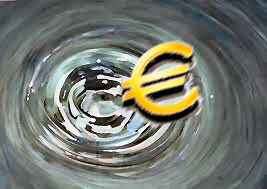 Amid a European and global economic crisis, governments are still letting markets get away with little regulation, big bonuses and dubious financial instruments that are distorting financial stability for short-term gain and putting enormous pressure on people to pick up the manufactured debts
Amid a European and global economic crisis, governments are still letting markets get away with little regulation, big bonuses and dubious financial instruments that are distorting financial stability for short-term gain and putting enormous pressure on people to pick up the manufactured debts

Much of Britain’s press is relentlessly euro-sceptic, to the extent that the euro’s survival is being talked down and political supporters of Europe no longer speak up. For a change, think of some of the benefits.
Once again financial markets which were prime movers in causing the economic crash in 2008 are gambling on destabilising currencies. Back in the 1990s the pound bounced around wildly in the hands of speculators and it is again weak against the euro, despite the euro’s problems. The euro brought new stability to currency markets, challenging the supremacy of a US dollar, exposed by America’s massive budget deficit.
Several countries, like Montenegro in former Yugoslavia, have the euro as the official currency without being a formal member of the euro zone, because their own economies are not viable enough. Ecuador's economy hit the rocks and the country now uses the US dollar as its national currency to inject more stability.
Currency devaluation is a mixed benefit for getting out of trouble. It doesn’t tackle underlying structural problems. Nor does it help businesses in a balanced way. The last time the UK devalued its currency, economists realised that while exports may be helped, major importing economies like the UK see price inflation linked to currency devaluation in important sectors like cars, food, energy and raw materials.
As UK North Sea oil and gas reserves decline the country will be reliant on more expensive imports paid in dollars. A study for the Government’s Department of Business Enterprise: UK Continental Shelf Oil and Gas Production and the UK Economy, predicts that in a few years the UK could run up a cumulative deficit in oil and gas imports of over $500 billion – to add to our economic troubles.
Governments are still letting the markets get away with little regulation, big bonuses and dubious financial instruments that are distorting financial stability for short-term gain and putting enormous pressure on people to pick up the manufactured debts.
Financiers are now leveraging unsustainable interest rates on loans to Greece and Italy at levels similar to states on permanent aid like Pakistan and Egypt, forcing Italy to pay a 20 per cent addition to its debt in interest. Imagine a house-buyer saying they were in difficulty and being told: “Okay, we’ll triple your interest rate on the loan.” Something is wrong. The tail is wagging the dog and politicians need to get a grip.
Members of the European Union enjoy the historic integration of a continent so recently divided by wars. People can live and work across the Union with reciprocal health benefits. Yes, there are things about Europe we can improve, but countries don’t lose their identity by being better connected. They are enriched and learn from each other.
Brian McGavin Nov 2011

Comments
Sheila Newman
Fri, 2011-12-02 12:02
Permalink
US debt - Global Trap theory
James Sinnamon
Sat, 2011-12-03 14:46
Permalink
Solution to paper economic crises is Public Banking.
Add comment